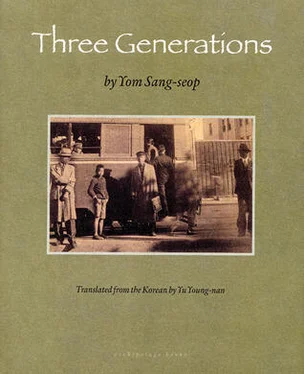The old man was now saying that although he felt like banishing his daughter-in-law from the family for her public tirade, he would forgive her for the sake of her children. He told her never to come to his house again, words usually aimed at his son. That was rough enough in itself, but when he interrogated her about the Suwon woman’s possibly suspicious conduct, Deok-gi’s mother broke out into a sweat.
Before she was able to explain how her words had been misconstrued, the old man, still in bed, began ranting and raving, arms and legs flailing like an outraged child; so she ended up returning home without being able to make her case.
“You and that husband of yours are praying that I’ll die soon! I’m sure he’s praying to that of God of his, but you? Are you praying to mountain and river spirits? Who knows what a witch like you might do to me next. Poison my medicine?” It had been quite a tantrum. Deok-gi’s mother was appalled by these remarks and loathed him all the more. Even though the old man blindly accepted what his young wife whispered to him and heaped scorn on his daughter-in-law, she was willing to pay the sick man a visit as soon as the following day because he was the family elder. But now she was afraid that she might be blamed for something she didn’t do or be tricked in some way. What if something were to happen to the old man right after her visit? The Suwon woman wasn’t to be trusted.
Annoyed by the family turbulence and knowing that his presence was of no use, Deok-gi decided to leave. When he visited the Hwagae-dong house, his mother burst into tears, lamenting how she had failed to defend herself against her father-in-law’s rage. Sitting in the outer quarters with his friends, his father said coldly, “You’re leaving? Well I guess I’ll see you during spring vacation then.” As the son was about to kneel on the floor to offer a formal bow, the father stopped him. “Don’t worry about that, son. Just go on now.”
Was his father being too modern? No matter where he went, Deok-gi felt downright uncomfortable, out of place. When he was about to leave, though, his father approached the edge of the veranda and asked him, in a barely audible voice, “Deok-gi, where’s that bar you talked about the other day?”
“It’s at Samjeongmok on Bonjeongtong.”
As Deok-gi was about to return to the inner quarters, his mother, who was waiting at the outer gate to say good-bye, asked, “What were you saying about Samjeongmok?”
Without thinking, Deok-gi made a face but quickly came up with an answer. “We were talking about a bookstore.”
As she followed him out to the middle gate, his mother recalled something she had heard. “Isn’t that Gyeong-ae girl somewhere in a bar over there?” Caught off guard, Deok-gi said, “I don’t know.”
His mother’s face blanched at her son’s betrayal. She suspected that he was siding with his father and had decided to keep her in the dark.
After Deok-gi left, snowflakes began to fall. In the outer quarters of the Hwagae-dong house, the guests started playing mahjong. It was Friday, and as there were no activities at church, they all felt like staying on and playing a game or two on this snowy evening. Everyone hoped that Chinese food would be ordered or that they’d eventually head for that bar they sometimes went to in secret.
Outside, large snowflakes were blanketing everything in white. They lit up the gloomy room.
Since they were upstanding Christians, they took the precaution of locking the gate in the outer quarters and speaking in low voices as they played. Only the clinking of mahjong tiles drifted from the room.
“I’m sure we’ll have a good harvest next year, too. Look at all the snow we’ve gotten this year.”
“You’re right. We should at least have good harvests. Though someone like Mr. Jo will certainly disagree.”
“What’s the use of having a good harvest in times like these?”
When the electric lights came on, the master’s dinner tray was brought in, but no one showed interest in the food.
The maidservant was not pleased. Whenever they played table games, the guests usually ordered out for Chinese food, and the dinner tray would be left untouched until deep into the night, which meant that she couldn’t retire to her room even on a cold night like this. If they actually ordered enough food so that she could taste a few leftovers herself, it might be a different story, but she knew these guests always licked the dishes clean, as though they were ghosts who had starved for three lifetimes.
She asked the master, “Should I take your meal back and bring it out again when you’re ready to eat?”
The master told her to leave it, and after consulting with the guests in a low voice, he wrote down the names of the dishes he wanted her to order at the Chinese restaurant, just as expected.
“Lock the gate to the outer quarters. And if anyone stops by, tell them I’m not home.”
Even though everyone was a brother or a sister before God, the master of this household, being a yangban, used a less refined form of speech when addressing his underlings at home. What’s more, the maidservant thought it was rather odd that he ordered her to send away any visitors rather than simply lock the gate. She’d never received such instructions before.
Was he expecting a debt collector? Were they planning to stay up all night playing mahjong? The maidservant had her suspicions, but the truth of the matter was that on the list of Chinese dishes was six hundred grams of Chinese liquor, and they intended to enjoy it as they took in the snowy evening. If any church members outside their clique were to stop by, it would ruin the festive mood and immediately put them on the defensive.
As the second round of mahjong neared its end, the Chinese food was delivered. The keeper of the outer quarters went out to open the gate. It was dark outside and snowing less heavily.
When the keeper shouted to the inner quarters, the maidservant emerged with a tray that she set on the edge of the veranda, onto which she transferred all the food. Inside, the mahjong players hurried to finish up the game before the tray was brought in.
The outer gate squeaked open and footsteps, crunching the snow, approached. The maidservant, caught by surprise, found a man standing behind her clad in a black Western-style suit.
“Who are you?”
“Isn’t the young master from the main house here?”
“Well, he was here, but he’s gone now.”
Inside, everyone went silent as though they were in a gambling den being raided by the police. The door opened a crack, and the visitor could see the master, still seated, frowning.
“It’s just me.” The visitor doffed his hat and bowed.
“Ah, I wondered who it might be. Come on in.” The master stood up, seeing that it was Byeong-hwa, and a smile spread across his face, as though he were relieved, perhaps even glad, to see him.
“That’s all right, sir. I heard your son was leaving today, and I just came by looking for him.”
“He’s already gone. He wasn’t at home?”
“When I dropped by a while ago, I was told he came over here.”
“It’s cold out there. Please come in.”
“No, thank you, sir. I’ll just be on my way.” Byeong-hwa’s curiosity was piqued, however, by these Christians gambling behind closed doors.
“Don’t be silly,” the master urged him. “Come in and warm up a bit before you go. It’s freezing out there.”
Sang-hun was displeased with the maidservant for not locking the gate, but he was being as kind as he could, thinking he couldn’t shoo this chatterbox away with all this food spread out and a liquor bottle in full view. He also had something else in mind.
The truth was that Byeong-hwa was able to get in only because the Chinese deliveryman was standing at the gate. Otherwise, he would have been sent away, covered with snow. Byeong-hwa stepped up to the veranda to join them inside.
Читать дальше












